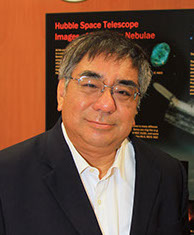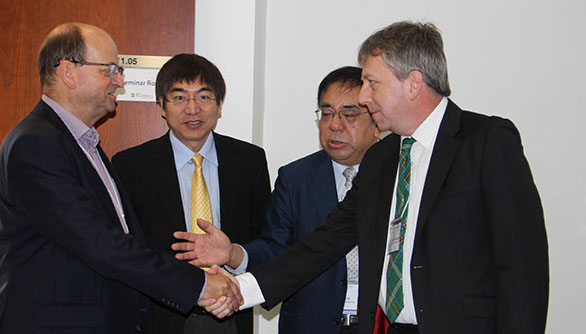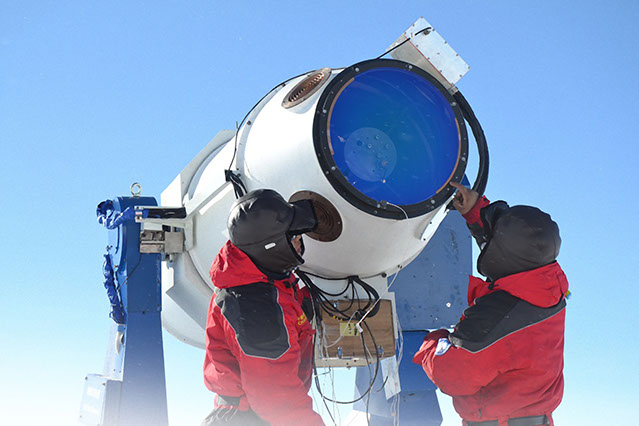TAKING IT TO THE NEXT LEVEL
HKU’s hosting of a major international forum on the Antarctic Survey Telescopes is both an exciting mark of the University’s leading role within the international science community and a sign of the collaborative nature of research today.
HKU recently played host to the 2015 International Collaboration Meeting on Antarctic Survey Telescopes, attended by some 40 scientists and researchers from around the world. The purpose was to review the progress on and discuss the plans for future operations of the latest telescopes that have been installed on China’s research programme at Dome A, the highest point of the Antarctic plateau.
Dean of Science Professor Sun Kwok, who led the conference, said Professor Wang Lifan, Director of the Chinese Center for Antarctic Astronomy, had asked HKU to host in recognition of the work that the University has done. He added that such international collaborations are the way forward for science research: “HKU has developed a strong research profile over the past 15 years, but to go to the next step in Science we need access to major facilities, which means collaborating with other countries.”
He pointed out that in the past countries such as the United States, Australia, France, Germany and the United Kingdom could go it alone on big projects, but now because of immense costs involved, the trend is towards international ventures.
He cited the Large Hadron Collider at CERN (Conseil Européen pour la Recherche Nucléaire, or European Council for Nuclear Research), which cost US$10 billion to build and about US$1 billion a year to maintain, as an example. It started out as a European project, but now most of the world’s major countries are involved – including China, Japan and Singapore. Likewise the Hubble Space Telescope cost more than US$2 billion and is a joint venture between NASA (National Aeronautics and Space Administration) and the European Space Agency.

![]() As Dean of Science, it is my job to take HKU Science to a higher level. We can’t be stuck. To get to that next level we need to collaborate with others. Not only Mainland China, but the international community at large.
As Dean of Science, it is my job to take HKU Science to a higher level. We can’t be stuck. To get to that next level we need to collaborate with others. Not only Mainland China, but the international community at large. ![]()
Professor Sun Kwok
A question of access
“In Hong Kong, we don’t have the space or the funds, so it’s a question of access,” said Professor Kwok, adding that the Antarctic Survey Telescopes project is another example. China is a latecomer to Antarctic research – all major countries are involved in Antarctica somehow – and with this project has now made it a high priority.
“Dome A is the highest plateau in Antarctica and the prime site for astronomical observations – conditions there are almost as good as going into space, but cheaper and (slightly) less troublesome. The reason the site has not been claimed before is that it is very difficult and expensive to access and the conditions are hostile. An ice-breaker is used to transport people and supplies as near to site as possible, then it’s a hard trek overland.”
China has a specialised team of engineers and technicians trained to deal with the harsh conditions. They go for a few weeks at a time only, and for six months of the year the site is unmanned: Scientists collect and analyse the data via internet.
China has led the development of the Dome A site, and HKU is playing its part, with Professor Kwok being a principal adviser. Two optical telescopes have already been installed on the site and Professor Kwok is particularly interested in the next phase: “My experience is in infrared telescopes, one of which is being installed next, alongside a sub-millimetre-wave telescope.
“HKU, and indeed Hong Kong could never achieve this on our own. We don’t have satellites or ocean-going research vessels,” said Professor Kwok. “But we are part of China so I’m proposing that we integrate better with the Mainland to take advantage of what they have to offer. We need to take Hong Kong science to the next level via China.
“Some people want Hong Kong to be isolated or separate, but in terms of science we want Hong Kong to be part of the larger community – not only China but the international community. As Dean of Science, it is my job to take HKU Science to a higher level. We can’t be stuck. To get to that next level we need to collaborate with others. Not only Mainland China, but the international community at large.”
And for the future, Professor Kwok has his eyes fixed on an even bigger enterprise – space, with plans now underway to establish a space centre at HKU. “Space is a common platform for science, and a lot of science today is dependent on access to space,” he said. “President Mathieson has been very supportive of the space centre, and while the funding is not huge, it’s a start.”

President Peter Mathieson (first from right) being introduced by Professor Sun Kwok (second from right) to
Professor Jeremy Mould (first from left), Department of Physics and Astronomy, Swinburne University of Technology and former Director of National Optical Astronomy Observatory, USA, and Professor Wang Lifan (second from left), Director, Chinese Center for Antarctic Astronomy.
Another Leadership Appointment for
the Respected Astronomer
Widely acknowledged as one of the leading experts in the world in the study of stellar synthesis of organic compounds, Professor Sun Kwok, was elected as the President of the International Astronomical Union (IAU) Commission on Astrobiology in August.
During his three-year tenure as President, Professor Kwok will help the Union toorganise worldwide research and education activities in astrobiology. Professor Kwok’s discovery of stellar organics has generated worldwide interest in the possibility of stellar organics enriching the early Earth and therefore having influenced the origin of life on Earth. Led by Professor Kwok, HKU Science successfully organised the first international astronomical symposium entitled ‘Organic Matter in Space’ in Hong Kong in 2008.
Next



